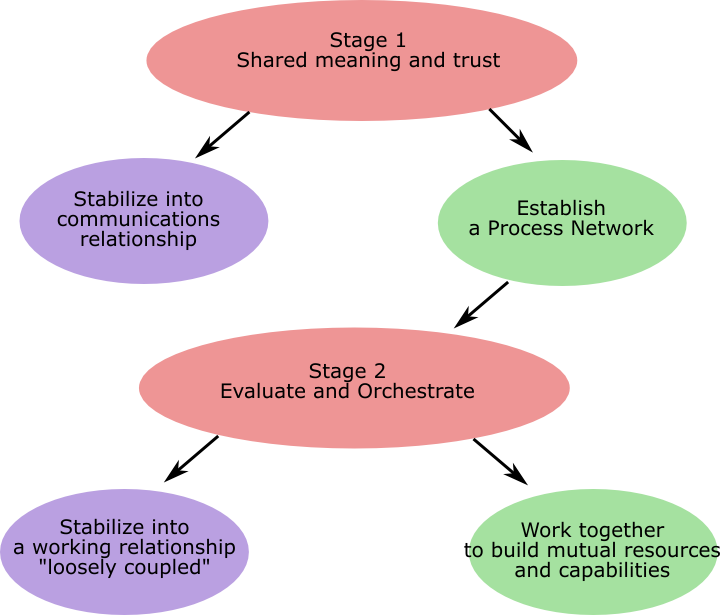Process Network Building Theory
Diagram
Stage 2 Evaluate and Orchestrate
They mutually evaluate one another's capability to accomplish the proposed work, and they decide which group will fill what role based on the capability assessment. Then they select individuals to act as "orchestrators" to help coordinate, and to make sure that reciprocation of value is reaching participants satisfactorily.
Tools and Techniques
Examples of people summarizing discussion into wiki pages
This concept actually emerged from the first wiki. If you read the page of the inventor of wiki http://c2.com/cgi/wiki?WardCunningham you'll see his description of how he goes about doing this. You can also see this in http://www.usemod.com/cgi-bin/mb.pl? and http://communitywiki.org
All of those wikis are "CommunityOverContent" wikis, which means there is some very cutting edge thinking and discussion going on, but the purpose of the wiki is for a group of close collaborators to create a PatternLanguage, as opposed to creating pages for a publication. Readability is less important than evolution of mutual understanding, in those wikis.
When Wikipedia was founded, and when Media Wiki software was created, the purpose of the wiki in that case was ContentOverCommunity, the community was dedicated to content. So, the discussion was moved off of the content page, and to a talk page, and the content pages in Wikipedia were organized for maximum readability.
Most communities that use wiki are usually some degree of a hybrid of these two purposes. So, MediaWiki becomes a great tool for them to both try to develop a PatternLanguage (as you see happening at http://c2.com/cgi/wiki? and http://www.usemod.com/cgi-bin/mb.pl?), and trying to develop good quality readable content, like a Wikipedia-type encyclopedia site. P2P foundation falls under this category.
Sometimes, though, two groups that are trying to collaborate, when they are in "stage 1" of the process described above, can use more of an open CommunityOverConent space, because it is more important to try and create a PatternLanguage at that stage (Shared understanding), and to build trust (through Shared Understanding, and through mutual equitable evaluation/review of existing knowledge bases). Stage 2 is when they will be able to join forces on the creation of refined content.
References
- The Only Sustainable Edge John Hagel, JS Brown - Boston: Harvard Business School Publishing, 2005
